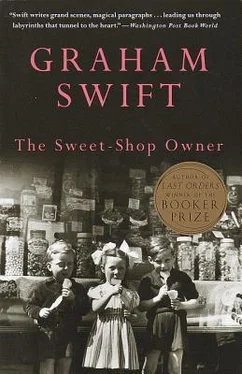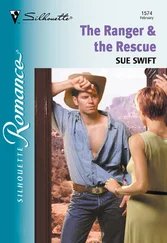Graham Swift - The Sweet-Shop Owner
Здесь есть возможность читать онлайн «Graham Swift - The Sweet-Shop Owner» весь текст электронной книги совершенно бесплатно (целиком полную версию без сокращений). В некоторых случаях можно слушать аудио, скачать через торрент в формате fb2 и присутствует краткое содержание. Год выпуска: 2012, Издательство: Vintage Books USA, Жанр: Современная проза, на английском языке. Описание произведения, (предисловие) а так же отзывы посетителей доступны на портале библиотеки ЛибКат.
- Название:The Sweet-Shop Owner
- Автор:
- Издательство:Vintage Books USA
- Жанр:
- Год:2012
- ISBN:нет данных
- Рейтинг книги:4 / 5. Голосов: 1
-
Избранное:Добавить в избранное
- Отзывы:
-
Ваша оценка:
- 80
- 1
- 2
- 3
- 4
- 5
The Sweet-Shop Owner: краткое содержание, описание и аннотация
Предлагаем к чтению аннотацию, описание, краткое содержание или предисловие (зависит от того, что написал сам автор книги «The Sweet-Shop Owner»). Если вы не нашли необходимую информацию о книге — напишите в комментариях, мы постараемся отыскать её.
The Sweet-Shop Owner — читать онлайн бесплатно полную книгу (весь текст) целиком
Ниже представлен текст книги, разбитый по страницам. Система сохранения места последней прочитанной страницы, позволяет с удобством читать онлайн бесплатно книгу «The Sweet-Shop Owner», без необходимости каждый раз заново искать на чём Вы остановились. Поставьте закладку, и сможете в любой момент перейти на страницу, на которой закончили чтение.
Интервал:
Закладка:
‘Today,’ he said, in oddly final tones, ‘is different.’
It must be because he wanted to be alone with the girl. He wanted her to go so they could talk about her behind her back.
She raised her neck and swallowed the little upsurge in her throat.
‘Besides,’ Mr Chapman stared more waterily, ‘in this heat — I expect you’re ready for a breather.’
Breather indeed!
‘I’ve my shopping to do,’ she said, rebutting the suggestion she had time to relax.
She looked at Sandra as if it was she who had directly contrived all this. And Sandra, seeing Mrs Cooper for once genuinely at bay, gave a look of out-and-out ferocity.
‘Good then,’ Mr Chapman said. ‘You go off till two, and Sandra, you take from two to three.’ (Mrs Cooper’s eyebrows shot up at the whole hour he would be alone with Sandra.) ‘I’ll go to Pond Street when you come back. It’ll mean of course, Mrs Cooper,’ Mr Chapman paused and his eyes seemed to take on a distinctly tender gaze, ‘that you’ll be alone in the shop while I’m gone. But,’ he paused again, ‘perhaps it’s time you were used to managing by yourself.’
Mrs Cooper sniffed at the attempt at appeasement.
But then — what did he mean? — ‘time you were used to managing by yourself’? Her feelings rose at the sudden prospect of him yielding at last to her much-repeated advice — taking care of his weary body in those plump arm-chairs at Leigh Drive — dozing under a sunshade in the garden (with a fold-up garden table and an iced drink) — where she would at last join him, but only after first staunchly conducting the day’s business at the shop. Eventually they’d sell the shop. They wouldn’t need it anyway, with all that money (she’d find out how much it really was) Mrs Chapman had left. They’d simply stop work. And they’d take, at last, that holiday. That long, long holiday …
But it didn’t alter the fact that there was something between him and that girl.
‘Well —’ she drew a breath. ‘One o’clock it is then. You won’t mind if I rest my legs a while in the stock room?’
Mr Chapman nodded, turning to a customer.
She went into the stock room, filled a tumbler of water at the sink and pulled one of the battered easy chairs as far back as possible, opposite the doorway into the shop, so that she sat, like a hidden observer, spying on the others through the veil of the plastic strips. The strips fluttered now and then in the breeze from the electric fan. She couldn’t see Mr Chapman, only occasionally his left shoulder, but Sandra rocked on her stool before her, got up, moved to and fro along the counter and sometimes glanced sharply in at her as at an animal in a cage.
Well, she wouldn’t budge until she absolutely had to. She’d stay here and watch them as long as she could. Spend her whole lunch hour here if need be. She strained her ears for words, but caught nothing. She looked around at the cluttered stock room — the piles of cardboard boxes, the door to the lavatory, the sink and mirror in the far corner with the collection of brooms, brushes and floor-cloths heaped beside it, the thumbed and tattered lists on the wall, the murky sky-light above with its rust-streaked glass, masking even now the brilliant sunshine — and felt something of the prisoner’s desolation. She sniffed. He never bothered about the stock room, let it get into the filthiest state. It was almost as if he relished the difference between its shabbiness and the brilliance of the shop itself. Once a fortnight she tidied it — though he never asked — swept the dust and scraps of paper from the floor, cleaned the sink and lavatory, made it as spotless as possible. But he never thanked her.
She looked at Sandra’s back on the stool and her tumble of glossy hair, through the plastic strips. She wasn’t deceived.
From her inner recess the shop, even the street beyond with its dazzle of traffic, seemed momentarily fanciful and intangible — a surface you could stick your hand through. How hot it was! Her neck itched. Her skin crawled and pricked. The heat made her feel soiled, abused. Going to lunch first! Upsetting the pattern!
Lunch-time customers were crowding the counter, but, between their shoulders, she just glimpsed, out there in the street, the door of Hancock and Joyce open and Mr Hancock step out into the sunlight. Would he come to the shop first, across the road? No: along the pavement, past Powell’s, and straight — she knew without having to keep sight of him — to the Prince William. A stiff, upright figure as he strode. But she wasn’t deceived. Everyone knew: that wife of his. She was funny in the head. They’d put her away once. Eight years ago she’d run off with some other man. And someone had told her once, on good authority, that that other man was none other than Mr Chapman’s brother-in-law.
All deceit and running away. She watched the hot faces at the counter. Look at Dorothy, his daughter, running away like that. Some man, a university lecturer — he’d said that much. And look at her own wretched desertion, twenty-seven years ago. It was a sultry, heavy afternoon — the kids, at least, were asleep — and she’d known he wasn’t coming back. He was all fixed up with that bag of tricks in Birmingham. Letter on the bedside table. She’d sat unmoving on the sofa in that room left untidy by the boys. Cushions on the floor; toys. And even later, when the boys had grown and she moved to the new flat, even now, she hadn’t shaken off from herself that sense of the world receding and that room fixing round her, with the upset toys, still and frozen. Then she’d got up and pursed her lips and begun to clear the mess. And she hadn’t stopped since.
Through the doorway in front of her Mr Chapman appeared, edging towards the till — how laboriously he moved sometimes — and as he did so he seemed to lean over deliberately towards the girl.
The plastic strips shimmered for a moment, like striped deck-chairs on a hot beach, like coloured sunshades …
Twenty-past by the clock. Her shopping had to be done. At least she had no illusions. Let him have his little fancy and let them talk about her while she was gone. She could still act, she could still have her scene. She’d get her own back on that little bag of tricks.
She put the empty tumbler back above the sink and drew out her handbag from the shopping basket propped against the wall. Eyeing herself in the mirror, she powdered her nose, spread the collar of her blouse a little more flatly over her shoulders and sprayed a jet of sandalwood under her chin. She entered the shop with a sudden flinging back of the plastic strips and paused for a moment, taking breath, levelling a glance at Sandra, in the doorway.
‘Off to the shops. Anything I can get you, Mr Chapman?’
‘Er, no thanks, Mrs Cooper.’
She brushed past the girl and the man — sixty years old! — and out into the hot envelope of the street.
Mr Chapman watched her turn right under the awning and pass by the window. How old is that woman? he thought.
25
1969. You were twenty that June. A student at London University. No longer a girl. Your smooth swaying stride and your softened woman’s figure — in blue jeans and a purple coloured top, now you were going to university — should have proclaimed it. Save for that uncertain way you held your head, as if you were surprised to find, so soon, you’d grown up.
You had left school for the last time. Out of the gates, with the others, scuffling homewards, onto the noisy bus, through the High Street, warily, in your uniform; for the last time. ‘O’-levels, ‘A’-levels, your essay on Keats which won the school prize: a place at university. Did you step away from it all, as you stepped out of your uniform, as if a new life beckoned?
Читать дальшеИнтервал:
Закладка:
Похожие книги на «The Sweet-Shop Owner»
Представляем Вашему вниманию похожие книги на «The Sweet-Shop Owner» списком для выбора. Мы отобрали схожую по названию и смыслу литературу в надежде предоставить читателям больше вариантов отыскать новые, интересные, ещё непрочитанные произведения.
Обсуждение, отзывы о книге «The Sweet-Shop Owner» и просто собственные мнения читателей. Оставьте ваши комментарии, напишите, что Вы думаете о произведении, его смысле или главных героях. Укажите что конкретно понравилось, а что нет, и почему Вы так считаете.












